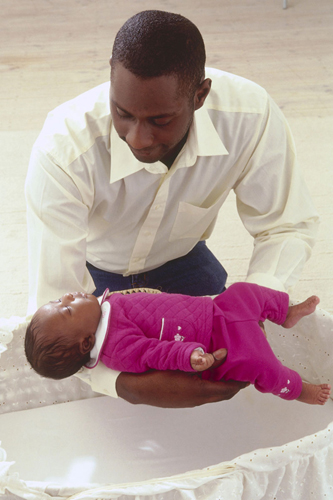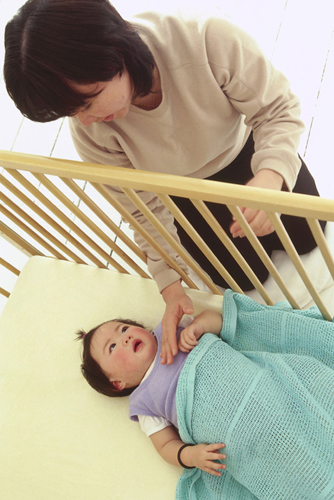| Q: |
How much sleep do newborn babies need?
|
| A: |
Sleep for the first 1–2 months of life usually occurs around the
clock. The sleep-wake cycle comprises sleep and waking to be fed,
changed, or nurtured. Newborns have an irregular sleep-wake cycle and
sleep anywhere from 10 to 18 hours a day. Wake times can last from 1–3
hours at a time. Sleep is very active and half of a baby’s sleep time is
spent in REM sleep (active sleep).
|
| Q: |
How can I help my baby develop a sleep pattern?
|
| A: |
Newborns should be put to bed when they are sleepy so they will
start to learn how to get themselves to sleep. There are many theories
and many books on how to develop sleep patterns in newborns and infants,
but each child will have his or her own pattern that can gradually be
adapted to our society’s day–night cycle. Exposure to bright light and
play during the day will keep a baby awake for longer, while a quieter
and dimmer environment toward nightfall will be more conducive to sleep.
|
| Q: |
Does a breastfed child develop sleep disturbances after breast-feeding stops?
|
| A: |
There is currently no evidence to suggest that breast-feeding
your child (which involves a lot of awake time during the night) will
lead to sleep disturbances once the child comes off the breast.
|
| Q: |
How should a baby be put to bed?
|
| A: |
Babies should be put to bed when they become sleepy, and not when
they are asleep. Make sure the head, face, and neck are clear of
bedclothes and put the baby on his or her back. (See also Sleep and sudden infant death syndrome).
|
| Q: |
Is co-sleeping good or bad for babies?
|
| A: |
Co-sleeping (sharing a bed) is common in many cultures. There is
no hard and fast evidence to suggest an increased risk of suffocation of
the child. It is generally recommended that the infant be put to sleep
in a separate room from the caregiver to avoid affecting the sleep-wake
cycle of the adult. Many parents feel they are thereby becoming
inattentive to their child’s needs, but there is some evidence to
suggest that they tend to get up even more often if they hear the child
crying. There is some evidence to suggest that children who later
develop sleep problems experienced co-sleeping in their infancy. In
adults, sleeping apart has been shown to lead to a more refreshing
night’s sleep.
|
| Q: |
How does colic in my baby affect his/her sleep?
|
| A: |
Colic is one of the more common disorders affecting sleep in
infants. Usually it ends by 4 to 5 months of age. It is characterized by
fussiness that is inconsolable in the late afternoon or evening hours.
It is thought that colic reflects development of the brain during the
first few months of life. Eventually the colicky behavior will settle,
but associated sleep problems may not unless the parents or caregivers
enforce a sleep-wake routine consistently. Colicky infants miss periods
of sleep during their attacks, which can affect their sleep-wake cycle.
|
| Q: |
Once the colic has ended, how do I get my baby to sleep?
|
| A: |
You must enforce regular daytime and night-time sleep patterns
and adhere to them. The morning wake-up time is the most important
aspect of the schedule–it must be fixed and consistent. Bedtimes at
night should also be strictly adhered to. Being persistent with this
routine is the single most important aspect of getting your baby back
into a regular pattern.
|
| Q: |
Can cow’s milk allergy cause problems with sleep in infants?
|
| A: |
It can be difficult to differentiate cow’s milk allergy from
colic. However, your doctor will be able to do some blood tests to
establish the diagnosis of allergy. Infants with cow’s milk allergy
often have very frequent night-time awakenings and their total sleep
time is reduced. Crying during the daytime is common and the infant
appears to be fussy. Problems with behavior and sleep can be easily
resolved once cow’s milk-based formula is discontinued. Symptoms should
normalize within about 2 weeks.
|
| Q: |
My baby needs to drink a lot during the night–is this affecting her/his sleep?
|
| A: |
Excessive nocturnal fluid intake is a recognized cause of
disturbed sleep at night both for the baby and parents. Babies who drink
large volumes of fluid (8–32oz) during the night typically awaken with
heavily soaked diapers in the morning. From the seventh month, the
infant should not be waking up at night to feed. Reasons for awakening
to eat at night include: a learned response associating food with sleep,
bladder distension causing awakening, and learned hunger. If large
volumes of fluid are consumed the problem is one of excessive fluid
intake. If the infant consumes small volumes of fluid, then the
association of sleep with the presence of a parent is more important.
|
| Q: |
How can I wean my baby off fluids?
|
| A: |
The trick is to gradually reduce the amount of the nightly
feeding and fluid during the night over a period of about 1–2 weeks.
Diluting milk with water can also help. If you are breast-feeding and
your baby’s cry results in “letting down” of milk, it may be better for
you to express this milk and feed it through a bottle, diluting it
gradually and weaning your baby that way. Your letdown will stop once
the baby is sleeping through the night and no longer wakes up crying.
|
Myth or truth?
Myth
“Children naturally develop an appropriate sleep-wake cycle”
Truth
This is not the case. The
process of establishing a regular sleep-wake cycle in children should
start right after birth. Children thrive on routine and their parents
and caregivers must ensure that the bedtime and morning routine is
enforced in a patient, persistent, and consistent manner.

Sleep and sudden infant death syndrome
Sudden infant death
syndrome (SIDS), or crib death, is the most common cause of death in
children up to the age of one year. The diagnosis is made after all
other possible causes of death have been excluded. Abnormalities in the
breathing and heart rate responses during sleep are likely to
contribute. The event that actually results in the death of a SIDS
victim is a fall in blood pressure and slowing of the heartbeat until it
comes to a standstill. Occasionally, there are genetic defects in the
heart rhythm, which can also cause death in this manner.
Risk factors
Other factors that
may increase the risk of SIDS include smoking during pregnancy and after
delivery. Probably the single biggest environmental factor that can be
modified is smoking. Nicotine has even been found around the heart fluid
in babies that have died of SIDS. Preterm babies, or those with a low
birth weight or genetic problems in breathing control, are at risk.
Other risk factors are illegal drug use by the mother during pregnancy,
winter weather, and letting the baby sleep face down.
Caring for a sleeping baby
Knowledge of these
factors makes for some simple but effective strategies in caring for the
sleeping baby. Always place the baby on his/her back to sleep. Avoid
smoking and being around smokers during pregnancy and when the child is
born. If your family has a history of heart rhythm abnormalities, it is
important to tell your pediatrician so the baby can be carefully
monitored and treated, if necessary.
